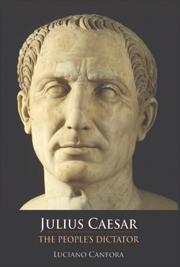Book contents
- Frontmatter
- Contents
- Translators' Note
- Acknowledgements
- Foreword
- PART I FROM SULLA TO CATILINE
- PART II FROM THE TRIUMVIRATE TO THE CONQUEST OF GAUL
- 9 The ‘Three-Headed Monster’
- 10 The Consequences of the Triumvirate: The View of Asinius Pollio
- 11 The First Consulship (59 BC)
- 12 An Inconvenient Ally: Clodius
- 13 Semiramis in Gaul
- 14 The Conquest of Gaul (58–51 BC)
- 15 The Black Book of the Gallic Campaign
- PART III THE LONG CIVIL WAR
- PART IV FROM THE CONSPIRACY TO THE TRIUMPH OF CAESARISM
- Chronology
- Bibliography
- Index
10 - The Consequences of the Triumvirate: The View of Asinius Pollio
from PART II - FROM THE TRIUMVIRATE TO THE CONQUEST OF GAUL
Published online by Cambridge University Press: 05 August 2013
- Frontmatter
- Contents
- Translators' Note
- Acknowledgements
- Foreword
- PART I FROM SULLA TO CATILINE
- PART II FROM THE TRIUMVIRATE TO THE CONQUEST OF GAUL
- 9 The ‘Three-Headed Monster’
- 10 The Consequences of the Triumvirate: The View of Asinius Pollio
- 11 The First Consulship (59 BC)
- 12 An Inconvenient Ally: Clodius
- 13 Semiramis in Gaul
- 14 The Conquest of Gaul (58–51 BC)
- 15 The Black Book of the Gallic Campaign
- PART III THE LONG CIVIL WAR
- PART IV FROM THE CONSPIRACY TO THE TRIUMPH OF CAESARISM
- Chronology
- Bibliography
- Index
Summary
Thou art treating of the civil strife that with Metellus' consulship began, the causes of the war, its blunders, and its phases, and Fortune's game, friendship of leaders that boded ill, and weapons stained with blood as yet unexpiated – a task full of dangerous hazard – and art walking, as it were, over fires hidden beneath treacherous ashes.
Horace, Odes 2.1, ‘To Pollio’The causal connection between the triumvirate and the civil war is stated in the opening lines of this ode to Asinius Pollio, in which the sometime republican Horace, still a sympathiser, but from a distance, salutes the birth and development of Asinius' work on the civil war. To Horace, many years after the event, the battle of Philippi remained the moment at which ‘Valour's self was beaten down’ (cum fracta virtus). This view, not unlike that of Cremutius, but clearly set in a poem which views everything with disenchantment, appears in a book which opens with a somewhat nervous announcement of Pollio's forthcoming historical work. It is the ode of ‘a shield ingloriously abandoned’, a nostalgic ode looking back on a politically critical moment.
The fact that Pollio's historical writings were lost along with other Roman historical literature is a matter of particular regret. It was not exactly what might be called ‘conformist’ writing. The most extensive direct evidence we possess is this ode, in which Horace seems concerned above all about the risks facing the author of a work of this kind: ‘thou art walking, as it were, over fires hidden beneath treacherous ashes’.
- Type
- Chapter
- Information
- Julius CaesarThe People's Dictator, pp. 72 - 77Publisher: Edinburgh University PressPrint publication year: 2007



